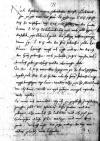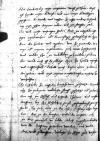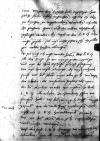Es gybt myr E(wer) (Virdige) (Gnaden) schrifftlich zu vorstehen, / wy XXX m(a)rc(k) geld(es), / von der contribution E(wer) (Virdige) (Gnaden) zuko(m)mende, / bey myr noch solde hynderstellik seyn bleben, / begeret der selbtig(en) underrichtung(e), weme sy, / E(wer) (Virdige) (Gnaden) ader den her(r)n poborczen, / solden zuko(m)men. / Hyrauff weyss ich nicht anders, / den das ich den her(r)n poborczen noch ynhaldt yrher register volkomlich gelt / gentzlich widder uberreicht habe. /
So dan E(wer) (Virdige) (Gnaden) vormuttet hyrynne yr zu korcz gescheen, begibt sich, das E(wer) (Virdige) (Gnaden), / wo och dy her(r)n poborczen / auff negst konfftigen 1533-12-13⌊tag Luciae1533-12-13⌋ / werden, alhy seyn zu Marienburg (Malbork), town and castle in northern Poland, Pomeranian Voivodeship, on the Nogat river, a branch of the Vistula at its delta, the capital of the Grand Masters of the Teutonic Order in Prussia (1309-1457), a voivodeship capital in Royal Prussia, which belonged to the Kingdom of Poland (1466-1772). Marienburg (taking turns with Graudenz (Grudziądz)) was the venue for the Provincial Diets of Royal Prussia, which were chaired by the bishop of Ermland (Warmia)⌊Marie(n)burkMarienburg (Malbork), town and castle in northern Poland, Pomeranian Voivodeship, on the Nogat river, a branch of the Vistula at its delta, the capital of the Grand Masters of the Teutonic Order in Prussia (1309-1457), a voivodeship capital in Royal Prussia, which belonged to the Kingdom of Poland (1466-1772). Marienburg (taking turns with Graudenz (Grudziądz)) was the venue for the Provincial Diets of Royal Prussia, which were chaired by the bishop of Ermland (Warmia)⌋, wo alsdenne / wurde an myr yrkeyn mangel erfunden, wils erfollen.
Es wirt och vormeldet, wy ich yn geystliche Iurisdiction greyffen solde, / von pfarrern(n) busze furdere / und denselbtigen / alze nemlich zu Lubdowo un(n)d och sust ym Golauschen etliche huben entczoge / und myr czueygente. / Vorhoff nicht, das sichs anders, / den wy von alders gehald(en), / wirt befynden.
 AAWO, AB, D.91, f. 71v
AAWO, AB, D.91, f. 71v
Hot Brochotzky, meyn amptman, wass gethon, / dass yss hynder meym bewust / un(n)d ane meyn bewilligen gescheen, / do werde wol wissen, / zo ichs anders befynde, wy myt yhm dorynne reden un(n)d yn stroffen sal. So wil nicht vorpurgen haben, das yn negstkonfftiger mythwochen ad(er) donnerstag(en) gewiszlich von hynken der Gollub (Golub), town in northern Poland, Kulm Land, on the Drwęca river, NE of Thorn, today united with Dobrzyń⌊GolavGollub (Golub), town in northern Poland, Kulm Land, on the Drwęca river, NE of Thorn, today united with Dobrzyń⌋ wil ergeben, / wu zo ymands / von myr ad(er) meynen amptleuten / sich wirt beschwerth und widder yhn / yn unbillik(ei)t gehandelt / sulenn, der wolde mich off dy selbtige czeyt zu Golav ersuch(e)n und ansprechenn(n). / Erbitte mich kegen eynen yederen(n) der gebur / und myt meynen amptsleuthen rechtes zu vorhelffen.
Dy schtocke, zo auff den kirchhowen gesatzt, / seyndt nhy zu yrkeyner weltlichn straff gesatczt ad(er) gebrauchen, den ich ym schloss und schtadt thorme und aussen dorffern bey den scholczen sunst gefengknysz genug habe. / Es sich aber yn der ersten Lutherey alzo begeben, / das yn den kirchen / under den ampten / och yn das gemehel un(d) bilder etlich ungestumikeyten von der Lutherey getriben worden / och under das volk geworffen, / welchs zo de<m> yn Got vorstor AAWO, AB, D.91, f. 72rbnem Jan Konopacki Sr (Ioannes de Conopat) (†1530), before 1500 Provost and Treasurer of Marienburg; 1508-1530 Bishop of Kulm (NITECKI)⌊vorygen hern(n) byschoffJan Konopacki Sr (Ioannes de Conopat) (†1530), before 1500 Provost and Treasurer of Marienburg; 1508-1530 Bishop of Kulm (NITECKI)⌋ habe angesagt, / hot solche stocke befol(e)n auffricht(e)n, off das dy alzo yn kyrchen yn ungestumik()eyten ubertreten(n), och aldo zu grosserm hoen / un(n)d der andern abschreck gestrofft wurden, / dy weyl es den E(wer) (Virdige) (Gnaden) alzo nicht gefelt, / sal myr nicht schwer sey(n) dyselbtigen widder heyszen / abbrechen.
AAWO, AB, D.91, f. 72rbnem Jan Konopacki Sr (Ioannes de Conopat) (†1530), before 1500 Provost and Treasurer of Marienburg; 1508-1530 Bishop of Kulm (NITECKI)⌊vorygen hern(n) byschoffJan Konopacki Sr (Ioannes de Conopat) (†1530), before 1500 Provost and Treasurer of Marienburg; 1508-1530 Bishop of Kulm (NITECKI)⌋ habe angesagt, / hot solche stocke befol(e)n auffricht(e)n, off das dy alzo yn kyrchen yn ungestumik()eyten ubertreten(n), och aldo zu grosserm hoen / un(n)d der andern abschreck gestrofft wurden, / dy weyl es den E(wer) (Virdige) (Gnaden) alzo nicht gefelt, / sal myr nicht schwer sey(n) dyselbtigen widder heyszen / abbrechen.
Es sal mich och nicht wunder haben(n), das E(wer) (Virdige) (Gnaden) alle dasjenige, / zo von myr yn gutter meynu(n)ge un(n)d myt des her(r)n bischoffs geheysz gescheenn(n), von myr vor argk a(n)nympt, / dy weyl mich och sunst vor Sigismund I Jagiellon (Zygmunt I) (*1467 – †1548), King of Poland and Grand Duke of Lithuania (1506-1548); Duke of Głogów (Glogau) (1499-1506), Duke of Opava (1501-1506), Governor of Silesia (1504-1506); son of King Kazimierz IV Jagiellon and Elisabeth of Austria⌊ko(niglische)r mai(este)tSigismund I Jagiellon (Zygmunt I) (*1467 – †1548), King of Poland and Grand Duke of Lithuania (1506-1548); Duke of Głogów (Glogau) (1499-1506), Duke of Opava (1501-1506), Governor of Silesia (1504-1506); son of King Kazimierz IV Jagiellon and Elisabeth of Austria⌋, meym aller g(nedigsten) h(herrn), von weg(en) der relicten / des verstorbnen pristers als eynen, der ko(niglische)r mandate unachte, / hot angeben(n), / zo doch E(wer) (Virdige) (Gnaden) alle relicten zu Graudenz (Grudziądz, Graudentium), city in Poland, Voivodeship of Pomerania, on the upper east bank of the Vistula, Graudenz (taking turns with Marienburg (Malbork)) was the venue for the Provincial Diet of Royal Prussia, which were chaired by the bishop of Ermland (Warmia)⌊GraudentzGraudenz (Grudziądz, Graudentium), city in Poland, Voivodeship of Pomerania, on the upper east bank of the Vistula, Graudenz (taking turns with Marienburg (Malbork)) was the venue for the Provincial Diet of Royal Prussia, which were chaired by the bishop of Ermland (Warmia)⌋ schon entfangen(n) hatte, / wy Sigismund I Jagiellon (Zygmunt I) (*1467 – †1548), King of Poland and Grand Duke of Lithuania (1506-1548); Duke of Głogów (Glogau) (1499-1506), Duke of Opava (1501-1506), Governor of Silesia (1504-1506); son of King Kazimierz IV Jagiellon and Elisabeth of Austria⌊ko(niglische)r mai(este)tSigismund I Jagiellon (Zygmunt I) (*1467 – †1548), King of Poland and Grand Duke of Lithuania (1506-1548); Duke of Głogów (Glogau) (1499-1506), Duke of Opava (1501-1506), Governor of Silesia (1504-1506); son of King Kazimierz IV Jagiellon and Elisabeth of Austria⌋, m(ein) a(ller) g(nedigsten) h(herrn) bryff, iungst ytzund(er) von der Wille an mich on the margin⌈an michan mich on the margin⌉ geg(eben), mytbrengen. Sal myr written over mich⌈michmyrmyr written over mich⌉ och E(wer) (Virdige) (Gnaden) herwidderum(m)b, so mich das vor Sigismund I Jagiellon (Zygmunt I) (*1467 – †1548), King of Poland and Grand Duke of Lithuania (1506-1548); Duke of Głogów (Glogau) (1499-1506), Duke of Opava (1501-1506), Governor of Silesia (1504-1506); son of King Kazimierz IV Jagiellon and Elisabeth of Austria⌊ko(niglische)r mai(este)tSigismund I Jagiellon (Zygmunt I) (*1467 – †1548), King of Poland and Grand Duke of Lithuania (1506-1548); Duke of Głogów (Glogau) (1499-1506), Duke of Opava (1501-1506), Governor of Silesia (1504-1506); son of King Kazimierz IV Jagiellon and Elisabeth of Austria⌋, m(ein) a(ller) g(nedigsten) h(herrn), entschuldigen(n) werde, / nicht vorargen(n).
Wasz aber sunst E(wer) (Virdige) (Gnaden) czweyunge von myr sich teth beduncken, / habe alle meyne tag(e) superinscribed⌈tag(e)tag(e) superinscribed⌉ keyn ursach geben(n)  AAWO, AB, D.91, f. 72v och zu czweyung(e) / vorursachen mich gehutt und vorhutten wil, / weyss aber solchs E(wer) (Virdige) (Gnaden) hefftigens widder mich setzens / ursachen nicht zu ermeszen, / musz es Sigismund I Jagiellon (Zygmunt I) (*1467 – †1548), King of Poland and Grand Duke of Lithuania (1506-1548); Duke of Głogów (Glogau) (1499-1506), Duke of Opava (1501-1506), Governor of Silesia (1504-1506); son of King Kazimierz IV Jagiellon and Elisabeth of Austria⌊ko(niglische)r mai(este)tSigismund I Jagiellon (Zygmunt I) (*1467 – †1548), King of Poland and Grand Duke of Lithuania (1506-1548); Duke of Głogów (Glogau) (1499-1506), Duke of Opava (1501-1506), Governor of Silesia (1504-1506); son of King Kazimierz IV Jagiellon and Elisabeth of Austria⌋, m(ein) a(ller) g(nedigsten) h(herrn), erkenthnysz, / dy es wol wirt entscheid(en), undergeb(e)n.
AAWO, AB, D.91, f. 72v och zu czweyung(e) / vorursachen mich gehutt und vorhutten wil, / weyss aber solchs E(wer) (Virdige) (Gnaden) hefftigens widder mich setzens / ursachen nicht zu ermeszen, / musz es Sigismund I Jagiellon (Zygmunt I) (*1467 – †1548), King of Poland and Grand Duke of Lithuania (1506-1548); Duke of Głogów (Glogau) (1499-1506), Duke of Opava (1501-1506), Governor of Silesia (1504-1506); son of King Kazimierz IV Jagiellon and Elisabeth of Austria⌊ko(niglische)r mai(este)tSigismund I Jagiellon (Zygmunt I) (*1467 – †1548), King of Poland and Grand Duke of Lithuania (1506-1548); Duke of Głogów (Glogau) (1499-1506), Duke of Opava (1501-1506), Governor of Silesia (1504-1506); son of King Kazimierz IV Jagiellon and Elisabeth of Austria⌋, m(ein) a(ller) g(nedigsten) h(herrn), erkenthnysz, / dy es wol wirt entscheid(en), undergeb(e)n.
 AAWO, AB, D.91, f. 72rbnem
AAWO, AB, D.91, f. 72rbnem  AAWO, AB, D.91, f. 72v och zu czweyung(e) / vorursachen mich gehutt und vorhutten wil, / weyss aber solchs E(wer) (Virdige) (Gnaden) hefftigens widder mich setzens / ursachen nicht zu ermeszen, / musz es
AAWO, AB, D.91, f. 72v och zu czweyung(e) / vorursachen mich gehutt und vorhutten wil, / weyss aber solchs E(wer) (Virdige) (Gnaden) hefftigens widder mich setzens / ursachen nicht zu ermeszen, / musz es 


